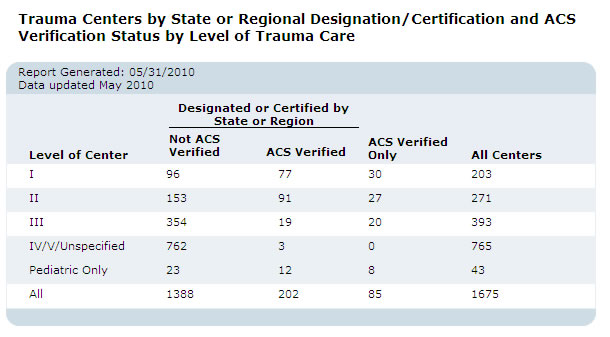
Hospitals who pursue trauma center accreditation must comply with the Standards of Accreditation. Specialty resources may also include 24-hour availability of a trauma resuscitation area in the emergency department, an operating room, laboratory testing, diagnostic testing, blood bank, pharmacy and inpatient units with specialty trained care teams. These providers may include trauma surgeons, neurosurgeons, orthopedic surgeons, cardiac surgeons, radiologists, and nurses. The major difference between a regular hospital and a trauma center is the 24-hour availability of a team of specially trained health care providers with expertise in the care of severely injured patients. How do trauma centers differ from regular hospitals? The Children’s Hospital of Philadelphia developed a video, Inside the Pediatric Trauma Center, which provides an example of the resources available in a Level I Pediatric Trauma Center. Hospitals treating children can be designated Pediatric Level I-II Trauma Centers. Hospitals treating adults can be designated Adult Level I-IV Trauma Centers. Level IV trauma centers, often smaller in size and located in a rural area, can provide initial care and stabilization of traumatic injuries while arranging transfer to a higher level of trauma care.

Level III trauma centers do not require neurosurgical resources. Level III trauma centers are typically smaller community hospitals that have services to care for patients with moderate injuries and rapidly stabilize and transport the severely injured trauma patient to a higher-level trauma center.Level II trauma centers provide similar specialty medical services and resources, but do not require the research and residency components.Level I trauma centers provide multidisciplinary treatment and specialized resources for trauma patients, require trauma research, and a surgical residency program.In Pennsylvania there are four levels of trauma centers. Trauma centers vary in their specific capabilities and are identified by Level designation. Conemaugh Memorial Medical Center continues to commit significant resources to maintain excellence in regional trauma care, establishing the services as a pace setter, the standard to which all other regional centers are compared.How many levels of trauma centers are there in Pennsylvania? The Conemaugh Memorial Medical Center Level 1 Regional Resource Trauma Center serves as the regional tertiary referral center for other regional centers. Educational commitment and resources are provided to all health care providers and professionals within the region to ensure optimal, state of the art care for injured and acutely ill patients throughout the entire spectrum of care from pre hospital providers, nurses, Emergency Medicine physicians and primary care physicians. Patients seen at outlying community facilities and lower level trauma designated centers can be easily and quickly transferred by ground or air to Conemaugh Memorial for emergent care. Family, which ultimately plays an important role in the patient’s recovery, has convenient access to the patient with minimal long term disruption of their daily lives. Our commitment to providing local trauma care means families are able to stay with their loved one after a traumatic event.

Trauma is disruptive and life-altering not only for the victim, but also the patient’s family.


 0 kommentar(er)
0 kommentar(er)
